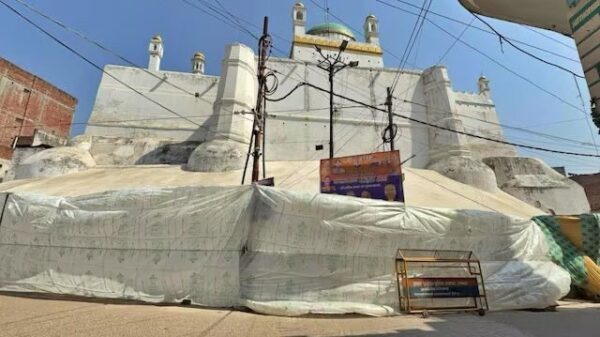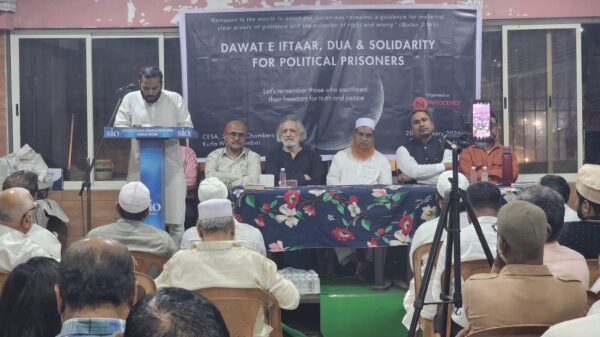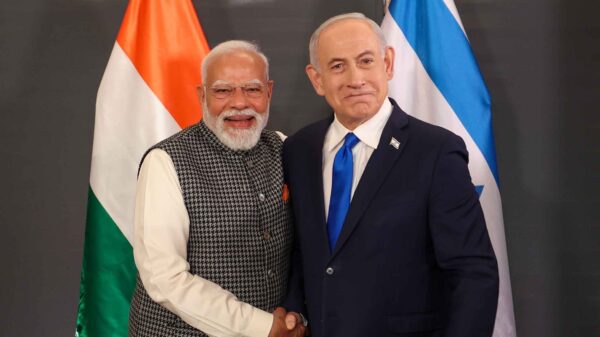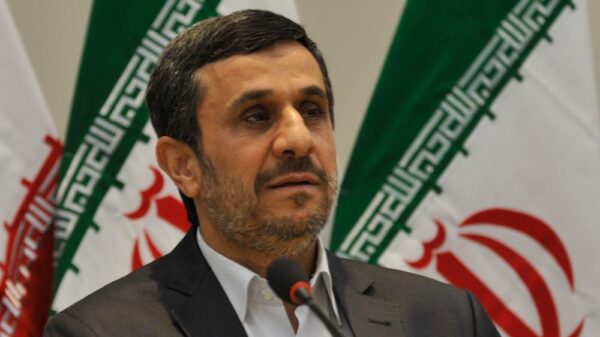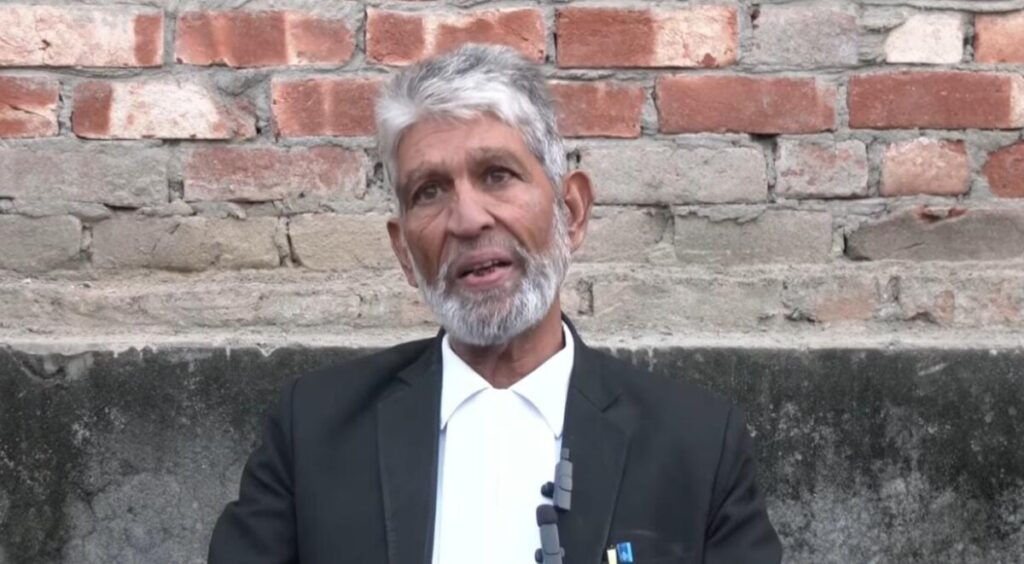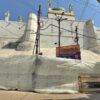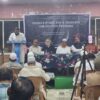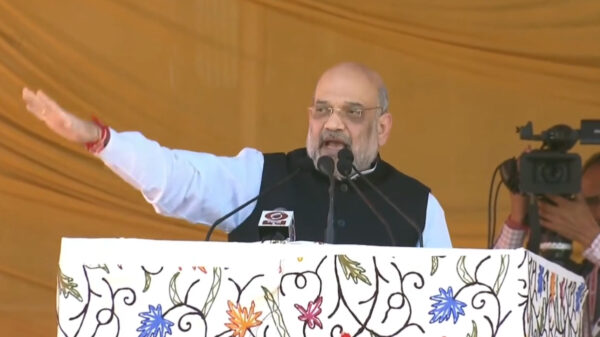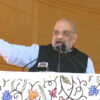On Thursday, March 27, Zafar Ali’s bail application was scheduled to be heard at the Chandausi sessions court. In conversation with The Observer post, Advocate Sagheer Saifi, one of the counsels representing Zafar, said that the police had not been submitting the case diary in the court, causing delay in hearing.
On March 24, the court directed the police to submit the case diary by March 27. However, with the hearing scheduled for 12:30 PM, proceedings were delayed due to the police’s failure to submit the diary on time. The case was finally heard at 2:00 PM before Additional District Judge-II Nirbhay Narayan Rai, who rejected the interim bail and scheduled the regular bail hearing for April 2.
Zafar’s counsel, Sagheer Ahmad, said that the “Police had modified charges before arresting him, adding two new sections of Bharatiya Nyaya Sanhita, 2023 (BNS). The section 230 (Giving or fabricating false evidence with intent to procure conviction of capital offence) and 231 (Giving or fabricating false evidence with intent to procure conviction of offence punishable with imprisonment for life or imprisonment) were added under which he was remanded to Judicial custody and sent to Jail. His remand application was released on March 23, the same day he was arrested.”
The bail application moved by the lawyers, which this correspondent accessed, stated that “Sections 230 and 231 of the BNS were added later against the applicant, which are not applicable in this case because the incident is said to have occurred on 24.11.2024, whereas the press conference took place on 25.11.2024. A press conference does not amount to conspiracy or incitement”.
It further stated that “In the notice for the applicant’s interrogation on 23.03.2025, Sections 230 and 231 IPC were not mentioned. These sections are subject to consideration by the Honorable Sessions Court, and their inclusion in this case is unjustified”.
The bail application raised a concern regarding the alleged pressure being faced by Zafar Ali, stating that “the administrative officers are pressuring the applicant to alter his statement, forcing him to deny that the five individuals he identified as victims of police firing were killed by the police and instead testify that they died due to firing by the public. Due to this pressure, the applicant was forced to accept responsibility, and a case was framed against him.”
The Police stated that he was arrested for his alleged involvement in the violence following a court-ordered survey of the mosque, while locals claim he was targeted.
The same day the violence was instigated following a court-ordered survey of the Shahi Jama Masjid on November 24, Sambhal Police registered at least eight FIRs, which this correspondent has accessed. The FIRs name Member of Parliament Ziyaurrehman Barq and Sohail Iqbal as the main accused, along with ‘700-800’ unnamed others—an act locals describe as a deliberate attempt to implicate Muslims in bogus cases.
According to the FIR accessed by The Observer Post, Zafar Ali was arrested based on a complaint filed by Jitendra Deepak Rathi, a senior official of the Vishwa Hindu Parishad (VHP). The FIR alleges that local Muslims, incited by Ali, attacked a VHP team that had arrived in Sambhal following the survey. He has been booked under multiple sections of the Bharatiya Nyaya Sanhita (BNS), 2023, including Sections 191(2), 191(3), 190, 221, 132, 125, 324(5), 196, 223(b), and 326(F), as well as Section 3 of the Bharatiya Sakshya Adhiniyam (Indian Evidence Act), 2023, and Section 5 of the Sarvajanik Sampatti Nuksan Nivaran Adhiniyam (Public Property Damage Prevention Act), 1984.
“The charges are totally bogus, and his arrest is a calculated move of the Administration, since he was both a lawyer who exposed the lies of the police and the president of the Jama Masjid. They arrested him despite his name not being in the FIR,” lawyer Sagheer Saifi said.
The police claim that Ali was among the first to receive information about the survey on November 19, 2024, and that he played a role in mobilising the protests that escalated into violent clashes between demonstrators and police.
While the police labeled the protesters as “rioters” and filed multiple cases against them, local residents allege that the administration has used legal action to target the Muslim community. So far, 77 Muslims, including four women, have been arrested on charges of stone-pelting at the police. Eight FIRs have been registered in connection with the incident, and the SIT has filed chargesheets spanning over 4,400 pages in six related cases.
The team was accompanied by a Hindutva group chanting religious slogans, which heightened tensions. As local Muslims gathered outside the mosque in protest, the situation escalated, leading to clashes between the demonstrators and police. Security forces opened fire, resulting in the deaths of five Muslim men and injuries to several others, including civilians and law enforcement personnel.
“On the very next day of the violence, November 25, Zafar Ali stated in a press conference that the police shootings had claimed the lives of innocent people. Nothing escalated after his Statements, the added sections are egregious and misleading in his case, an attempt to fabricate charges against him,” Sagheer said.
In Chandausi, protests against the arrest of Zafar Ali have been held for three consecutive days. On the call of the Chandausi Bar Association, Protests were held across courts in Uttar Pradesh, including Moradabad and Sambhal, where lawyers abandoned work expressing condemnation and demanding the transfer of the Police officers responsible in November escalations which claimed 5 lives and injured several others, and later on, a spree of First Information Reports (FIR) furnished Muslims as accused. The protesting lawyers have also been demanding investigation in the case, and have condemned the arrest of Zafar Ali.
Advocate Rahman, who was part of the protests against the arrest of Zafar Ali, said that the arrest of Advocate Zafar Ali is unconstitutional. “After his imprisonment, his family is not allowed to meet him despite him being severely ill. It is a violation of human rights,” he said.
“He is a heart patient, and has been hospitalized in the Jail hospital after we filed an application in the court seeking his immediate hospitalization due to health risks he faces at such an old age as 70,” Sagheer Saifi said.
Prior to the hearing, Sagheer Saifi told The Observer Post that they were seeking interim bail from the court, until the bail was not heard. In granting interim bail to former Delhi Chief Minister Arvind Kejriwal, Supreme court last year emphasised that “mere interrogation does not allow arrest,” suggesting that an arrest must be justified by more substantial grounds than just the need for questioning.
Arrested for speaking against the police killings
The intent of the Police behind his arrest, his lawyers say, was to ensure that he “doesn’t attend the meeting of the Judicial commision, on March 24, where he was yet to register his statements. They brought him from his home saying that we will just interrogate you.
In the same matter, MP Ziyaurrehman Barq availed a stay from arrest from the Allahabad High court earlier. “Under the sections which mandate a punishment of 7 years or less than that, he can be given a bail. However, the sections that there were in the FIR, despite not naming him, couldn’t be used to imprison him. So, they aggressively modified it to target him,” Advocate Sagheer Saifi told The Observer Post.
The maximum punishment under prior charges was 7 years, however, the modified charges extend to life Imprisonment or punishment up to ten years. In Zafar Ali’s case, he had said that the police firing claimed the lives of 5 people.
“Does stating that the police’s weapon claimed lives lead to the punishment of those involved?,” asks Sagheer, saying that these were trumped up charges.
Last year, He was briefly detained by Uttar Pradesh police immediately after a press conference where he accused senior district officials of orchestrating the firing on Muslim youth during recent protests. The press conference took place a day after the police killings.
During the press briefing, Zafar Ali detailed the events leading to the violence, which claimed five lives. He alleged that he witnessed the Deputy Inspector General (DIG), Superintendent of Police (SP), and District Magistrate (DM) discussing firing orders against protesters.
He also refuted claims that the protesters initiated the violence.
“I did not see any firing from the public. It was the police who were shooting. I even saw them using desi katta (country-made guns),” he said.
Ali claimed that the unrest could have been avoided if the Sub-Divisional Magistrate (SDM) and Circle Officer (CO) had addressed public concerns transparently. Instead, he accused the CO of hurling abuses, ordering a lathi charge, and threatening to shoot protesters.
“The mob became uncontrollable because they thought excavation was underway. Despite our appeals for calm and announcements clarifying the situation, the administration’s mishandling and lack of communication worsened the chaos,” he added.
Ali also accused local authorities of spreading panic and failing to provide leadership during the crisis.
“The DIG, SP, and DM were deliberating on issuing firing orders when I was present. I appealed to the people to go home and successfully dispersed 75% of the crowd, but the police actions were unprovoked and brutal,” he said.
“He held a press conference a day after the violence and said he witnessed the killings. We all knew he would be arrested,” Advocate Tariq said.
Advocate Sagheer Saifi, criticizing the rejection of his interim bail, stated, “The administration is exerting pressure to keep him imprisoned.” He argued that interim bail could have been granted, given that he is a lawyer and would have ensured his presence before the court on April 2. “A bond could have been signed with certain conditions, but they still rejected his interim bail despite his illness,” he added.
(Syed Affan is a writer and Journalist based in Delhi. His reportage focuses on Human rights, land conflicts, Policy)







